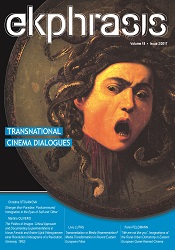The Politics of Images
The Politics of Images
Critical Approach and Documentary Experimentations in Harun Farocki and Andrei Ujică Videogramme einer Revolution (Videograms of a Revolution, Germany, 1992)
Author(s): Martina OliveroSubject(s): Fine Arts / Performing Arts
Published by: Universitatea Babeş-Bolyai, Facultatea de Teatru si Televiziune
Keywords: Romanian cinema; Critical theory; 1989 Romanian revolution; media theory; status of images; documentary; Eastern-Central Europe;
Summary/Abstract: The aim of the article is to show which status images assume in the aesthetics of Harun Farocki and Andrei Ujică, both coming from Eastern cultures but longstanding German residents. As a fact, Central Europe film industry could offer more opportunities, since Eastern Europe’s recent history has been suffering from the protracting influence of the Soviet Union. In particular, the focus here is on the late XX century events that twisted Romania and occupied an important place in the cinematography of both authors. Videograms of a revolution (Germany, 1992) is undoubtedly their masterpiece. What emerges from this film is the dialectical role that images play in relation to history and political power in the context of the ‘89 revolution. Since their function is not only commemorative but ontological, Farocki and Ujică use a critical approach, which belongs to the German philosophical and sociological culture, started from Kant and then pursued by the Institute for Social Research of Horkheimer and Adorno, to study how images have been doubly used for and against the communist propaganda. By experimenting with a new documentary form, Farocki and Ujică intend to question the responsibility of the camera in influencing the course of history.
Journal: Ekphrasis. Images, Cinema, Theory, Media
- Issue Year: 18/2017
- Issue No: 2
- Page Range: 29-46
- Page Count: 17
- Language: English

